Photo




‘‘ If everyone were cast in the same mold,there would be NO such thing as Beauty ‘‘ - Charles Darwin
4K notes
·
View notes
Photo
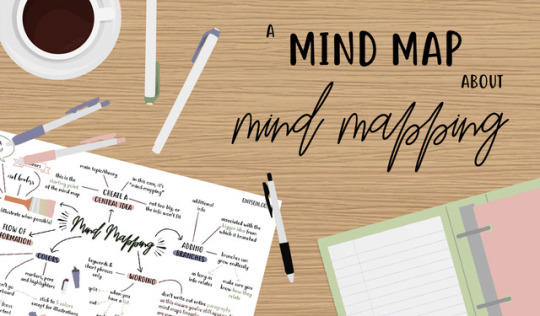

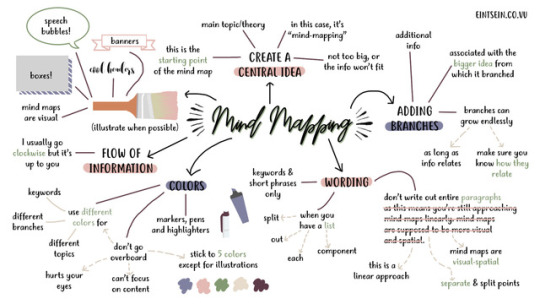
A MIND MAP ABOUT MIND-MAPPING
If you know me, you’d know that I am a highly visual person. I love learning from images and layouts, and my spatial intelligence is probably my strongest type of intelligence. Because of this, I often use mind maps to study, and so do a lot of other people. However, there are people who don’t really know how to make and utilize a mind map effectively. That’s what this post is for! Here’s how you can make your mind maps more effective and thus enable you to retain more information. (P.S. you might wanna zoom in)
By no means am I an expert in mind-mapping; these are just some habits I have when making a mind map that successfully does its job of helping me remember the topics I’m studying.
If you have any questions, feel free to drop an ask!
xx jo
20K notes
·
View notes
Text
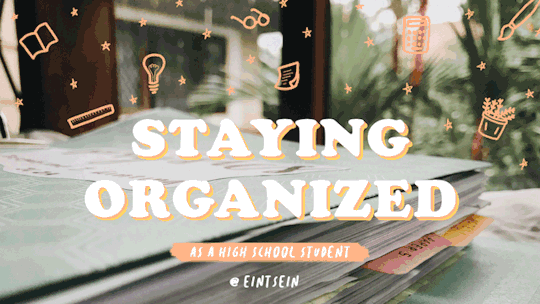
Hey guys, so I’m nearing the end of my senior year, and it’s been great so far! I accomplished my academic tasks efficiently and didn’t burn myself out, and I think the main contributor to my success as a student is my organization system. This system has been refined throughout my high school years, but I think now I’ve finally found the most effective methods.
Please remember that this isn’t the only organization system you can adopt; this is just the one that works the best for me, and I hope that by sharing it with you, you’ll gain a new perspective on how to stay organized as a high school student.

The first thing I wanna talk about is my notebook system, which I briefly mentioned in my Guide to Note-Taking.
My notebook system comprises three types of notebooks: the Everything Notebook, the subject notebook, and the revision notebook.
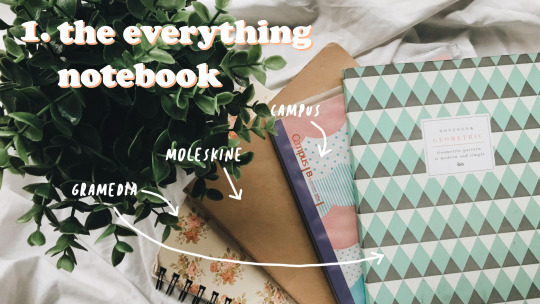
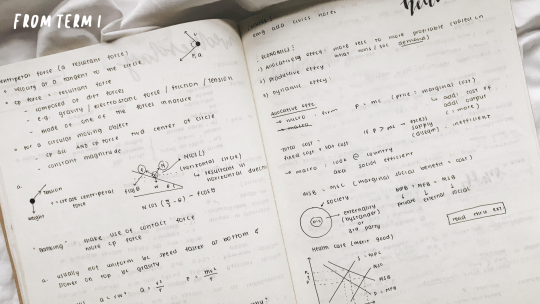
The Everything Notebook
The first stage is in-class notes. I only bring one notebook to school every day. I call it my Everything Notebook, and this is where I write down all of the notes I take in class. This way, I don’t have to lug around six notebooks where I’m only going to use a few pages in each of them that day.
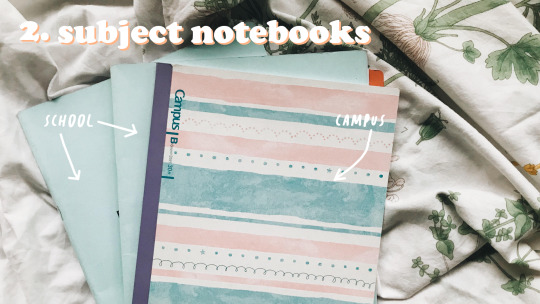
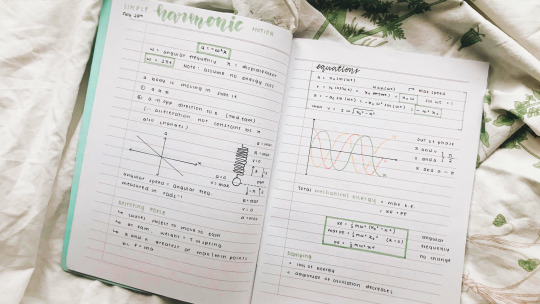
Subject Notebooks
At the end of the day, I would revise my notes and compare them to the syllabus so I know where we are in the learning process. I would then transfer my class notes from my Everything Notebook to my different subject notebooks. This is stage two. I also start to jazz up my notes because I use the notes in my subject notebooks to study for tests.
In addition to my class notes, I include material from my teachers’ notes that they might not have elaborated on, as well as points in the syllabus (I’m currently taking A2) that were only glazed over briefly, or not at all, in some cases. (Note: this does not mean they completely skip a chapter or topic; it’s more like they missed a few bullet points that should be in my notes but aren’t. An example would be if we’re learning about phenol reactions and the teacher forgot to mention the use of FeCl3 as a test for phenol.)
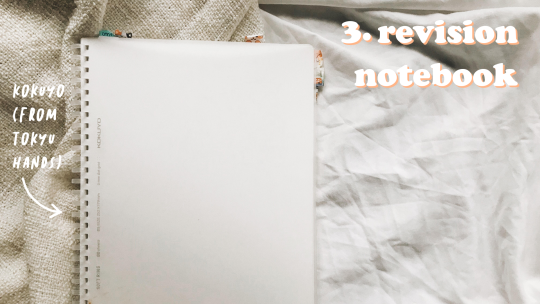
Revision Notebooks
Stage three comes a little later, when exam week is just around the corner. Essentially, I rewrite and improve my notes from my five different subject notebooks into a single revision notebook or binder. (Recently, I’ve opted for a revision notebook because they’re lighter and easier to carry around.)

Because my teachers don’t always teach in the order of the syllabus, the first thing I do is organize my notes according to the syllabus. I would then fill in any other missing gaps in the material that hadn’t been filled in stage two.
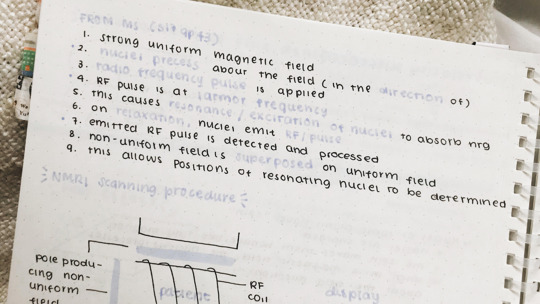
When compiling material for my revision notebook, I use as many sources as possible: my own notes, my teachers’ notes, youtube videos, online sites, and my favorite, the mark scheme! I add in some answers from past papers (explanations only, so no calculations) mainly to secure marks. It’s safer to memorize definitions straight from the mark scheme than from the textbook or from handouts. I also do this to ease my memorization, especially for topics that require lengthy explanations. It’s a lot easier to remember the 6 points I need to explain the principles of NMRI than to remember everything in the four-page handout my teacher gave me.

Folders and binders are essential to organizing your papers. Some people keep a single accordion folder for all their papers, but for me it’s just too heavy to carry around all the time. The same goes for subject folders that are brought to school every day.
Instead, my binder/folder system comprises my Everything Folder and my subject binders.
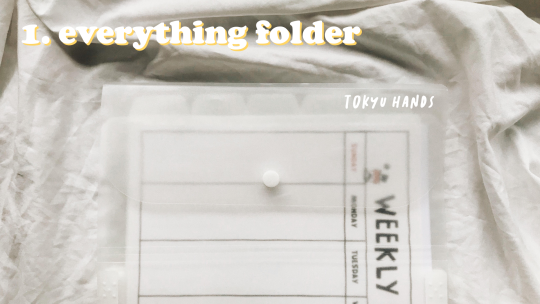
The Everything Folder
The folder I carry with me to school every day is this A4 folder I got from Tokyu Hands. It has 5 pockets, one for each day of the week, so all the papers I receive on Monday will go behind the first divider, and so on.
Some people also keep blank papers in their folders; I don’t because my school has its own lined paper and graphing pads that I keep under my desk that I use if a teacher asks us to do an assignment on those papers. If I do work at home, I prefer to just use a plain A4 paper or a legal pad.

Subject Binders
At the end of the week, I’ll sort my papers into my subject binders. Sometimes I’ll keep some papers in the folder if I think I’ll be needing it the next week. This usually only applies to worksheets because all my teachers’ notes are available on Google Classroom, so I can access them even if I don’t physically have them.
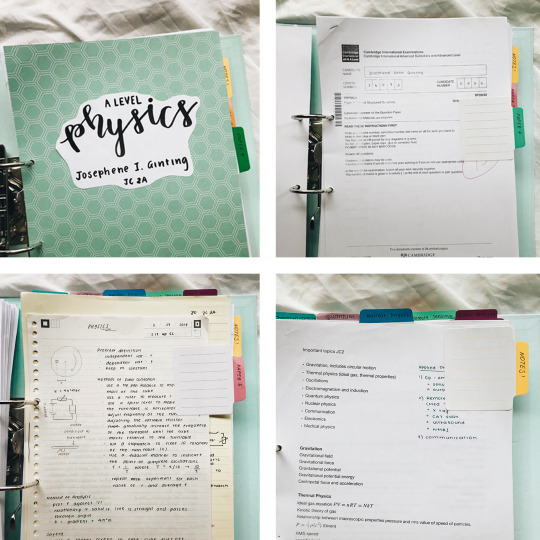
Each of these binders have sections inside them:
Physics: 1 for handouts, notes, and tests, 1 for Paper 4 (Theory), 1 for Paper 5 (Practical Planning). I included extra tabs to mark the different topics in the handouts section.
Chemistry: same as Physics.
Economics: 1 for Paper 3 (MCQ), 1 for Paper 4 (Case Study and Essay). A lot of my Economics material is online, though.
English: 1 for Paper 3 (Text and Discourse analysis), and 2 for Paper 4 (Language Topics, which includes 1 for Child Language Acquisition, 1 for World Englishes). Past papers, handouts, and notes all go under their respective topics.
Mathematics: I just keep everything together because I never revise math and just constantly do past papers.
This makes it easier for me to revise each subject because I can just take one binder with me instead of a messy folder with everything just shoved in there.

I keep a magazine file for each of my A-Level subjects (English and Mathematics are combined). All my textbooks, revision guides, and subject notebooks are kept here, so if I need to revise one subject, that’s the magazine file I’ll take out.
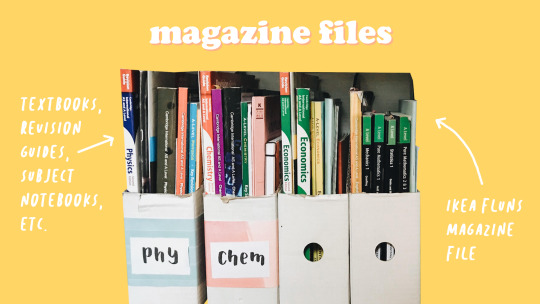
These magazine files prevent any small things (like my book of flashcards) from being shoved to the back of my bookshelf, or materials from different subjects from getting mixed up.

In my senior year, I mostly plan using this app called Edo Agenda. It syncs across all my devices for free and has all the features I need: a to do list to organize tasks, monthly and weekly calendars to organize events, a journal to organize notes and memos.

I used to bullet journal regularly, but it takes too much time during weekdays, so now I just bullet journal for the therapeutic effects it gives me, and I use an app for organizing tasks and events. Sometimes at the end of each week, I’ll transfer my tasks to my bullet journal and then decorate the page, but again, this is just for its therapy.

Organizing your school supplies is just as important as organizing your papers and notes. With a more organized backpack and pencil case, you won’t waste time looking for your things at the bottom of an abyss.
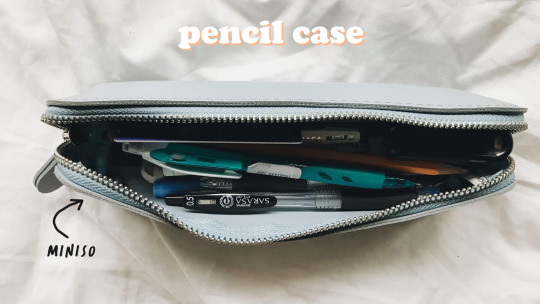
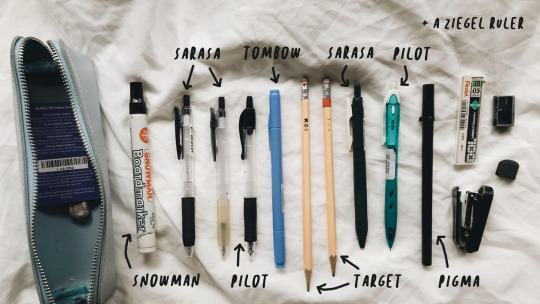
Pencil Case
I don’t find it necessary to bring so much stationery to school unless I plan on making notes at school (usually during revision week).
Backpack
Because we’re already in the revision term, I don’t really carry a lot of things in my everyday backpack, just the following:
Pencil case
Everything Notebook
Everything Folder
Revision notebook
Kindle
Phone
Wallet
Earphones
Calculator
Speaker
Drinking bottle
A pouch with things like a hairbrush, pads, and lip balm
And that’s all for now! I hope this post will help you organize your school life (if you haven’t already) or at least provide some useful insights on some ways to stay organized as a high school student.
45K notes
·
View notes
Photo

14.10.18
Revising for R.E,
feeling really productive with all the highlighters and mind maps.
809 notes
·
View notes
Text
Studyblr/Writeblr friends?
I’d really like to make some studyblr/writeblr friends. If you want to message me, feel free! Especially if you…
…are a bit older like me (I’m thirty-two),
…already graduated and are doing your own thing studywise,
…keep a bullet journal.
…care about continental philosophy a lot, or…
…study humanities in general or religion…
…write science fiction (I write space opera recently)…
I’m recovering from the flu right now, but will be online for a while! I locve studyblr and stuff, but so far I am having trouble finding humanities/philosophy-centric blogs for it. I majored in continental philosophy and want to get back into it even though it’s been ages since I left school!
21 notes
·
View notes
Photo


my real study spot: an almost-empty latte, scraps of paper, and notes that were quickly scribbled. as a studyblr, I admit that sometimes I let the pretty visuals take priority over actually studying but I’m trying to get better about that! let’s build a studious community that benefits us and not the aesthetic!
3K notes
·
View notes
Photo


Thurs Aug 2 // I’m so unspeakably excited for the next academic year; less than three weeks to go now!
3K notes
·
View notes
Text
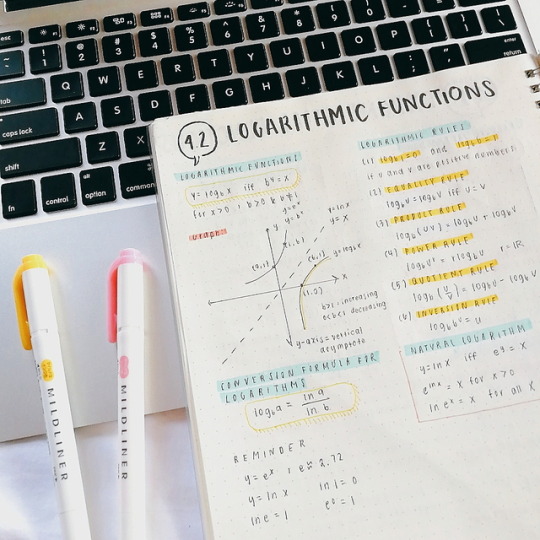
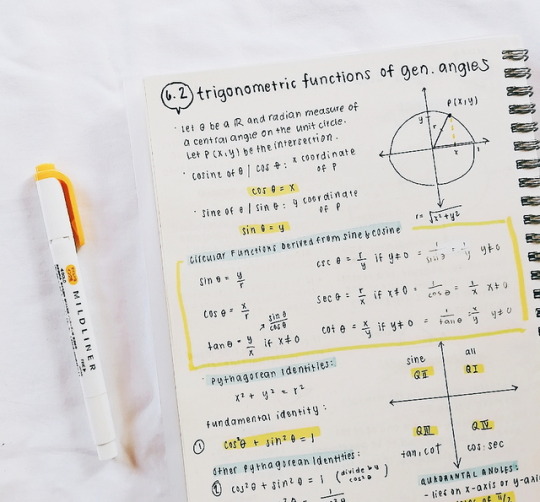
currently studying about functions 📐
insta: studie_ss ✨
3K notes
·
View notes
Photo

I love browsing used books. I think I spent about two hours this morning just in the natural history section at this book sale.
#study#studyblr#studyspo#study motivation#studying#college#school#new studyblr#study community#a level biology#a levels#a level maths#books
3K notes
·
View notes
Photo

3.3.18 // studygram: alimastudies
so i posted this on my instagram yesterday and it kinda became popular and i have no idea why???!!!!…… anyways, thanks for all the love i’ve been getting on my studygram and studyblr, i appreciate it so much!
Here are some biology summary mind maps which are so useful when it comes to revision! And omg can you believe its is march already!
“the bad news is time flies, the good news is you’re the pilot” - Michael Altshuler
7K notes
·
View notes
Photo

Couldn’t focus earlier, so I stopped and made banana bread. Now I’m back to work and have a treat to motivate me.
#studyblr#study#studyspo#study motivation#studying#student#a level biology#a levels#studycommunity#new studyblr#college#school
73 notes
·
View notes
Photo

I finally have a desk and a chair! No more studying on the floor for me. I guess I should think about furnishing the rest of the apartment now.
#study#studyblr#studyspo#studyinspo#study motivation#studying#student#school#college#a levels#a level biology#biology#math#new studyblr#studycommunity#study space#desk#bujo
141 notes
·
View notes
Text
hey, you super sweet studyblrs! my feed is kind of empty and i want to follow more studyblrs. reblog/like this post if you want me to follow you!!
395 notes
·
View notes
Text
How to Deal with Study Burnout
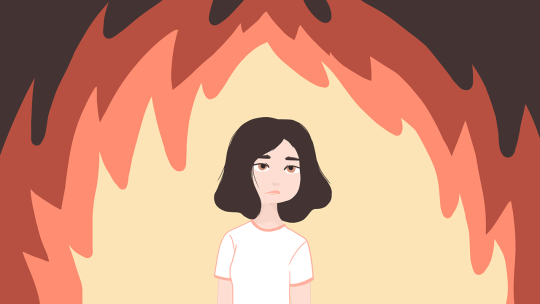
As students in this day and age, it’s quite common for us to juggle rigorous academic responsibilities and overwhelming extracurricular activities. As a result, we might feel burnt out. But what exactly is burnout?
Burnout is when you feel physically and mentally exhausted as a result of constantly lacking the energy required to fulfill the demands of your studying.
Burnout can be broken down into three parts:
Exhaustion is what causes you to feel tired all the time and unable to concentrate. You could also get sick or have trouble sleeping.
Cynicism or depersonalization is when you feel disconnected from those around you, e.g. your friends and family.
Inefficacy is a decrease in productivity, efficiency, or quality of your work.
How do you know if you have burnout?
Symptoms may vary, but they include:
Being unable to absorb new information
Intellectual exhaustion
Decreasing academic performance and productivity
Feeling like you need to prove yourself
Making yourself work even more, even though you’re exhausted or being unwilling to study further
Neglecting your needs
Long term fatigue
Showing disinterest in things you normally enjoy, e.g. hobbies or friends
Denying that something’s wrong with you (may manifest in the form of aggression)
Avoiding social interaction
Feeling empty and depressed
What can I do to fix it?
Here are some short term solutions for dealing with burnout.

1. Take a power nap
Power naps are life changing. They help you recharge your energy and get you ready to start working again. They also improve learning, memory, creativity, alertness, and mood. I would recommend napping for 30 minutes at most, because anything more will lead to a longer sleep session.
Optional: drink coffee before your nap - something that takes a short while to consume like a shot of espresso - so that you’ll feel alert and revitalized afterwards!
2. Take a shower
A cold one will wake you up, but a warm one will calm you down. I suggest starting with warm water, then ending with cold water.
3. Exercise
Whether it’s playing soccer or doing yoga, the important thing is to get moving! Exercise releases endorphins or happy hormones that help you combat stress.
4. Run a quick errand
This will help take your mind off things while also getting something done! You’ll also end up walking, which is technically a form of exercise.
5. Call or visit a friend
Sometimes what we’re lacking is social interaction, and hanging out with a friend definitely helps. Whether it’s providing you with a distraction or giving emotional support, your friends are always there to help you. Plus, science has shown that being with friends reduces your cortisol (stress hormone) levels.
6. Eat a snack
Preferably a healthy one. Eat something with proteins, vitamins, and fibers to boost your mood. Here’s a list of mood boosting foods.
7. Surf the web
This requires A TON of discipline, but it’s definitely a game changer. Surfing the web is one of the most relaxing things you could do. I personally look for a good laugh during my study breaks, so I’d watch a comedy or scroll through memes to get those happy hormones up and running.
8. Do an activity you find interesting, e.g. a hobby
We all need happiness in our lives, and our hobbies are perhaps the best way to find that joy. You could sit down with a page turning adventure, or go outside and shoot hoops, or listen to a podcast, or even bullet journal, as long as you’re having a good time.
9. Listen to music
Music is one of the ways we gain energy, so I always make time for it during the day. However, you should choose the right music, because not all the music you love is going to make you feel energized. For me, it’s pop punk with hard hitting beats, thundering guitars, and really upbeat, enthusiastic vocals. Some of you might be energized by mellow music with dreamy vocals that make you feel like you’re floating in the clouds. If you choose the wrong music, you might just end up feeling sluggish and drained.
10. Get some fresh air
Your brain needs 20% of the oxygen in your body. Fresh air brings more oxygen to your brain so that you can think more clearly, feel less tired, and concentrate more easily.
How do I make sure I don’t get it in the future?
Avoiding study burnout in the long term has a lot to do with our study habits - as well as our daily habits. We need to make sure that our bodies and minds receive the things they need, and that we aren’t overworking them.
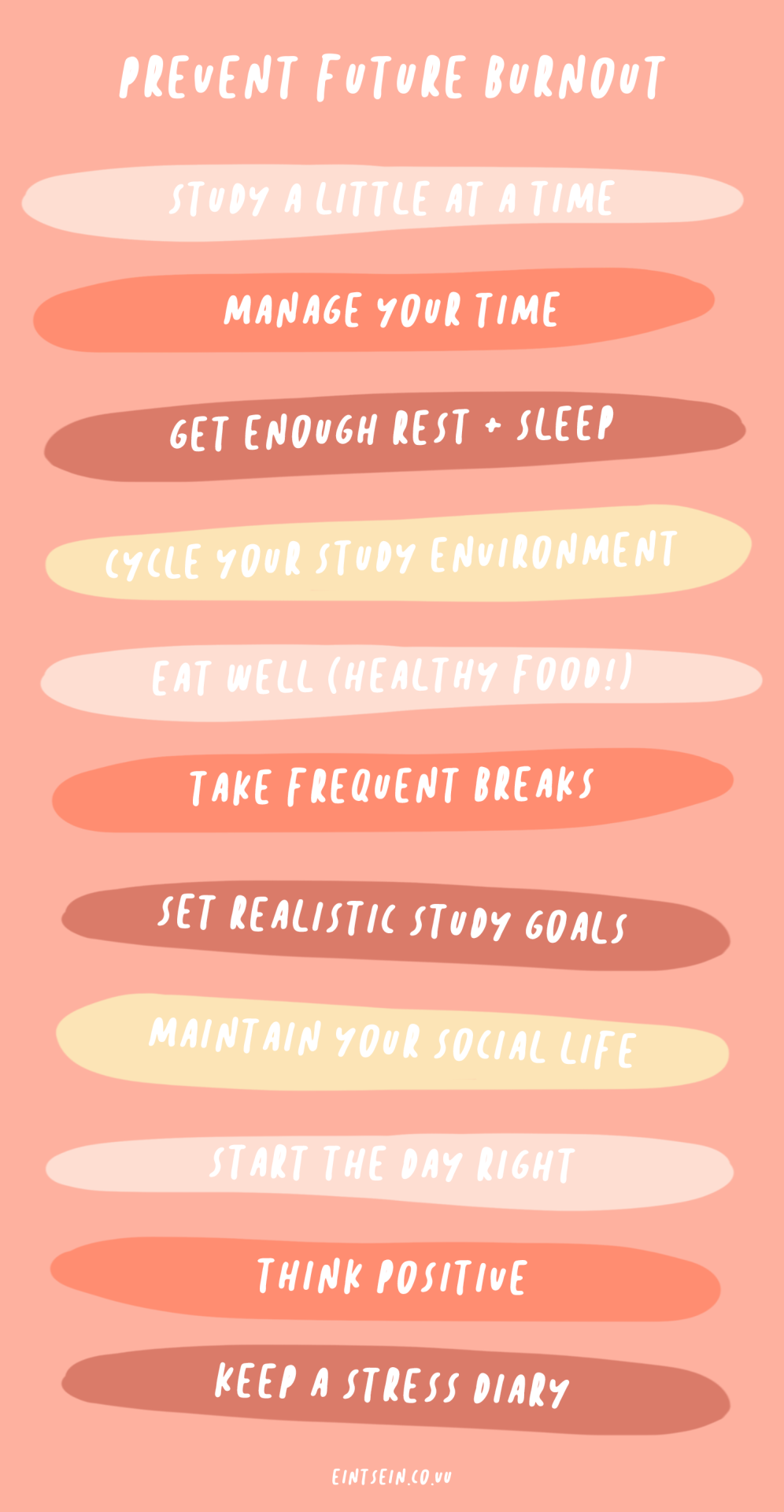
1. Study a little at a time
Break up your notes into smaller, more easily digestible pieces and learn a little at a time. This way, you’re not overwhelming your brain, and you have time to let that new knowledge settle in.
2. Time management
Having a good study schedule is crucial in preventing burnout. You don’t want to force yourself to work at your slow hours. Aside from that, you definitely shouldn’t leave things until the last minute, and sticking to a schdule will help you pace yourself. Here’s a post I wrote on How to Make an Efficient Revision Schedule and How to Beat Procrastination.
3. Get enough rest
I cannot stress enough that sleep is so important for you. It improves your cognitive functioning and also enhances your mood, making it less likely that you’ll get burnt out. Make sure to take power naps, too, if you feel like you need them.
You also really shouldn’t pull all-nighters. Sleep is also involved in cementing memories in your brain, so if you study a little before you sleep, you’re bound to remember more than if you studied a chapter during an all nighter.
Having trouble sleeping? Here’s a post I made about my night routine and how to get better sleep.
4. Cycle your study environments
Your body and mind are bound to get tired from being in the same location for prolonged periods of time. The best way to fix that is to study in different places: at your desk, your backyard, the dining table, a cafe, a friend’s house, the library, etc.You should find a frequency that works for you. I like to switch it up every 2-3 days; some people change locations every week.
5. Eat well
As I’ve mentioned before, healthy foods with protein, vitamins, and fiber greatly improve your mood and your physical health. Proper nutrition will give your brain the power it needs to push through. Also make sure not to skip meals; honestly you’ll just end up feeling terrible afterwards.
6. Take frequent breaks
Let’s face it, we’re human, we’re bound to get tired from studying for a long time. Taking breaks enables our brains to digest the information we just learned in a pace that works for it. Breaks also help us focus on something other than studying, so that when we do get back to it, we’ll be ready to digest even more information.
7. Set realistic study goals
You’re gonna memorize all 500 pages of your biology textbook in one day? Good luck with that. Some of you might be compulsive studiers, but this kind of habit isn’t very good for your brain or your physical health. Studies have shown that excess studying can lead to lower productivity, fatigue, and - you guessed it - burnout. In the end, this will result in lower academic performance, perhaps even in the long run. So instead of trying to study so much in one sitting or one day, break up your material into chunks.
8. Maintain your social life
Wherever you lie on the introvert-extrovert spectrum, everyone needs social interaction once in a while. It keeps you sane and healthy. Go out with your friends, have a sleepover, or maybe even a study date.
9. Start the day right
What we do in the morning can significantly affect our mood for the rest of the day. Sometimes we don’t even feel like getting up in the morning, or doing anything that day. One thing you should do is create a morning routine you enjoy to jumpstart your day. Here are 8 Morning Habits for Productivity.
10. Think positive
When we’re feeling burnt out, it’s hard to not think negatively about everything. In reality, that just makes our condition worse. So think positively! Start small, like congratulating yourself for getting out of bed today, and then work your way up to bigger accomplishments, like finishing 2 chapters of your textbook.
11. Keep a stress diary
This is kind of a new concept for me, but it’s really great. How it works is that each day, you would write down all the things that made you stressed and how they made you stressed. This will help you identify the things you’re doing that’s causing your burnout, e.g.
Too long study hours? take regular breaks
Too much time in the same place? cycle your study environment
Not eating properly? set aside time to eat healthy meals at least 2 times a day
Not doing the things you love? schedule in time for that, e.g. during your long breaks
Not getting enough human interaction? make a study group
Too much negative thinking? adopt a positive mindset (you can always start small)
Not getting enough sleep? fix your sleep schedule
And that’s all I have for you guys this time. Hope these tips will help you manage your stress and study burnout whenever you have them. And if you have any questions, don’t hesitate to drop an ask!
P.S. if any of you want to see the images in this post in better quality, click here (link to google drive)
29K notes
·
View notes
Photo



Taking notes outside with an eastern grey squirrel for company. I love when the pages of my notebook turn by themselves in the wind.
#studyblr#study#studyspo#study motivation#student#college#a level biology#a levels#study notes#notes#new studyblr#study community
10 notes
·
View notes
Photo

Perfect Saturday morning, coffee and a good book. I might have got a little behind with my studies, but new country and new home moves have been time consuming! I did go and check out some study spot options in the city this week, and I finally have a desk on the way, so I’m gonna get back on it in the next few days.
#study#studyblr#studyspo#study motivation#studying#student#new studyblr#study community#reading#bookworm#college#a levels
19 notes
·
View notes
Photo

Three days of travelling and I’m home. I haven’t unpacked and I’m jet-lagged, so today I am reading instead of studying. When I’m reading something relevant to my subjects I take notes in the same way I would take notes from a textbook. I have a specific notebook just for this purpose, filled with interesting facts from books I’ve read.
#studyblr#studyspo#study motivation#study#studying#student#college#a levels#new studyblr#a level biology#biology#study notes#reading#bookworm#books#book notes#study community
9 notes
·
View notes